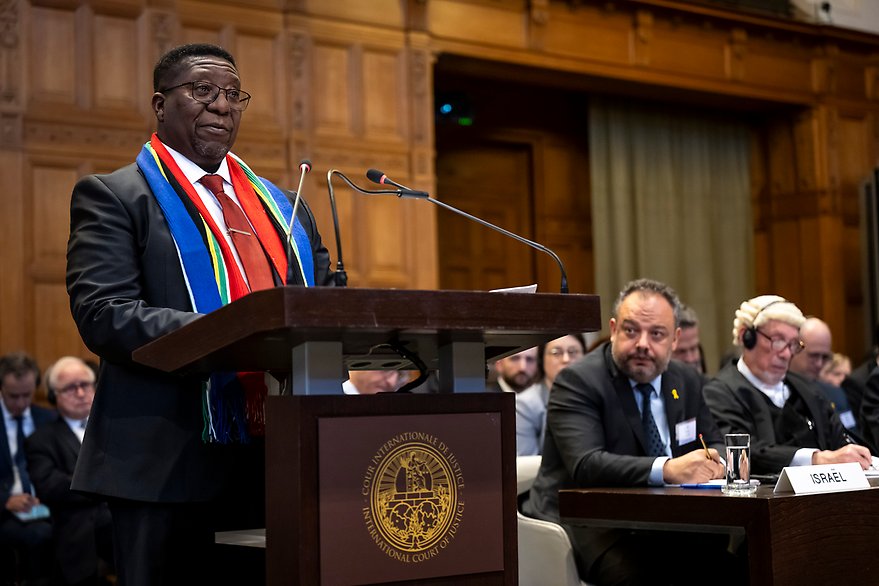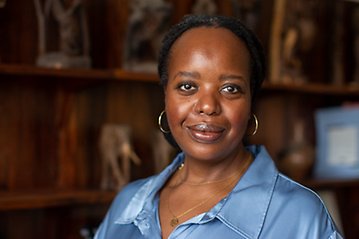South Africa’s ICJ win against Israel: A shift in the rules-based order?

South African Ambassador Vusi Madonsela speaks on behalf of the South African defense team in the Gaza genocide case against Israel made by South Africa in the Hague, the Netherlands.Photo ICJ
The recent International Court of Justice (ICJ) ruling against Israel over its war in Gaza, has put the “entire rules-based order on trial”, according to an NAI researcher, who argues it could signal a change in the balance of global influence.
The legal team representing South Africa in its case against Israel at the ICJ received a hero’s welcome upon their return to Johannesburg. In a case presented in The Hague in December, Israel was alleged to have violated its obligations under the 1948 Genocide Convention during its campaign to eliminate militant group Hamas in Gaza, a charge Israel strongly denied.
NAI Senior Researcher Babatunde Fagbayibo, an expert in international law, explains that it is a “powerful symbolic victory” that in effect not only put Israel on trial but “the entire rules-based order, which is perceived as not serving the global majority.”
South Africa's decision to pursue legal avenues marks a departure from traditional diplomatic channels, as South African Minister of International Relations and Cooperation Naledi Pandor explained in an interview External link. at US think tank the Council on Foreign Relations. “If you believe in international law, truly, then wherever sovereignty is infringed it must apply and this is the point we’ve been making, that we use the framework of international law unequally depending on who is affected, and we are arguing that that must change.”
External link. at US think tank the Council on Foreign Relations. “If you believe in international law, truly, then wherever sovereignty is infringed it must apply and this is the point we’ve been making, that we use the framework of international law unequally depending on who is affected, and we are arguing that that must change.”
South Africa was the second country to use the court this way, after The Gambia filed a genocide case against Myanmar in November 2019 over its persecution of Rohingya Muslims

Babatunde Fagbayibo. Photo: Mattias Sköld

Angela Muvumba Sellström. Photo: Mattias Sköld
Fagbayibo points out that while the ICJ lacks its own enforcement mechanisms, the ruling is a “starting point for diplomatic pressure and forces countries to consider their engagement with Israel, a political means of pushing for ceasefire.”
He adds: “The use of these international bodies and international law to highlight how the international order is being violated has far-reaching consequences, not only from a political standpoint but in terms of helping social movements gather momentum.”
Beyond the legal dimension, it can be argued that South Africa’s ICJ case seems to be indicative of a wider trend of growing assertiveness among African nations that threatens the established status quo, signaling potential changes in the balance of global influence.
This is exemplified by many African nations, including South Africa, resisting condemning Russia’s invasion of Ukraine, including declining to support UN resolutions on the matter, despite continuous pressure by the US and European nations to do so.
NAI Senior Researcher Angela Muvumba Sellström points out that, historically, African nations have been more inclined to side with other countries in the global South for ideological reasons and because of shared interests.

Henning Melber . Photo: Mattias Sköld
This has been especially true in the case of Palestine, which has long had ties with post-colonial liberation movements on the continent. Following the October War of 1973, the Organisation of African Unity severed ties with Israel.
Yet, today the situation has changed dramatically, with 44 of 54 African countries recognising Israel’s statehood, and close to 30 having opened embassies or consulates in Tel Aviv. At the beginning of the Israel-Hamas conflict in October, several African heads of state endorsed Israel’s position of having the right to defend itself.
The October War
The 1973 October War, also known as the Yom Kippur War, took place between Israel and a coalition of Arab states led by Egypt and Syria. The conflict began with a surprise attack by Egyptian and Syrian forces on Israel on the Jewish holy day of Yom Kippur. Both sides declared victory and the aftermath of the war led the way for the Camp David Accords peace agreement in 1978.
Muvumba Sellström does not believe that “states are picking and choosing their principles. “But “, she continues, “states interpret the rules based international order’s purpose and how it has been maintained over time differently, and thus, take decisions accordingly. “
"Just as Western countries do not always uniformly protect human rights, countries elsewhere in the world do not pay ultimate loyalty in their voting patterns to the protection of human rights“, she adds.
Adding another layer to this geopolitical complexity are the varying European positions on what is happening in Gaza.
NAI Associate Henning Melber argues that it undermines the EU's credibility in advocating for human rights in its partnerships with African nations.
This can be seen in tensions between Namibia and Germany over the ICJ case. The recently deceased Namibian president, Hage Geingob, chided Berlin’s decision to side with Israel over the case, accusing Germany of committing “the first genocide of the twentieth century in 1904–08, in which tens of thousands of innocent Namibians died in the most inhumane and brutal conditions.”
This, says Melber, shows “the sensitivity and precarity of relations”.
“This further erodes the legitimacy of the Western world, to the gain of powers like Russia and China”, he adds.
Coupled with African nations becoming increasingly aware of the resource-rich potential they have and increased competition for their resources, it gives them “more confidence to position themselves on the global stage”, according to Melber.
Fagbayibo thinks that African nations are caught in a delicate balancing act of combining their commitment to international peace with their national interests. “They grasp the rivalry between the major global players and the ways in which they can use this to further their interests. However, they have not always succeeded in using this to enhance the prosperity of their individual countries.”
TEXT: Heba Habib
